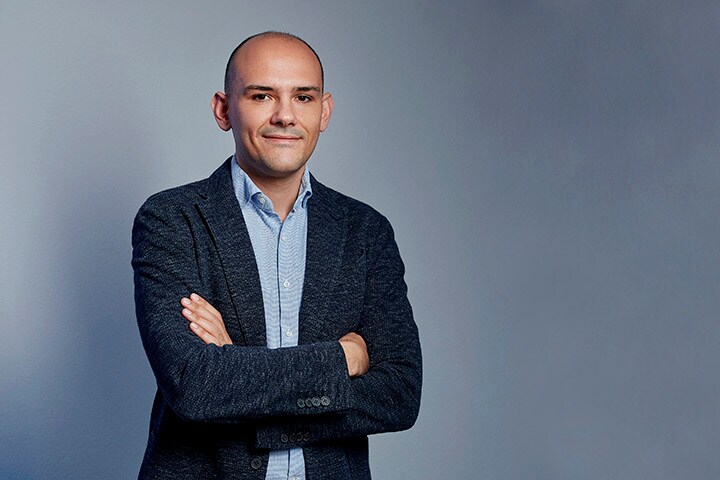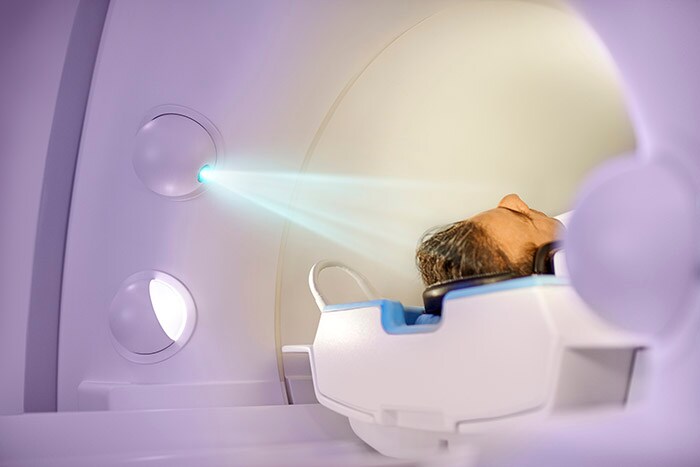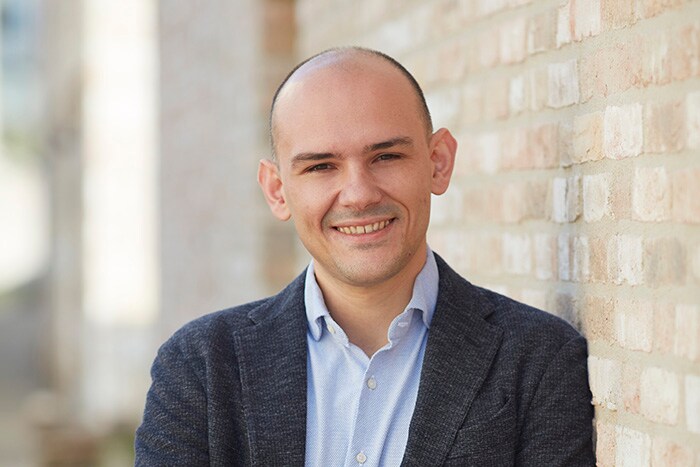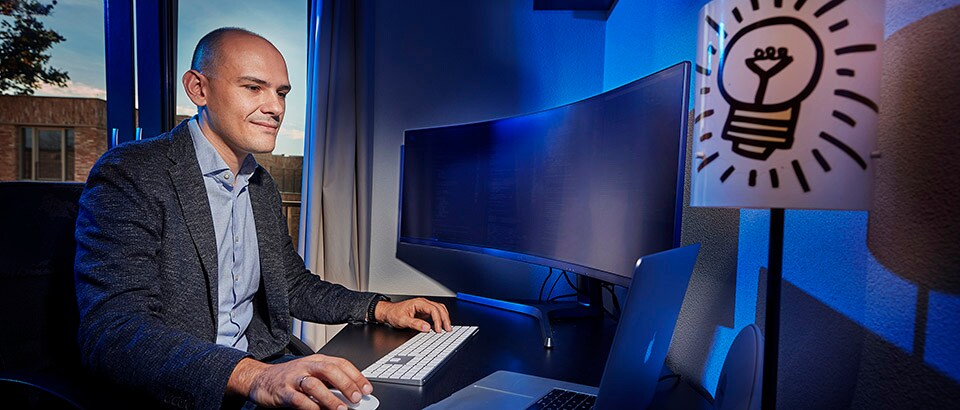Hij beschouwt Italiaans als zijn eerste taal. Programmeertaal C++ staat op de tweede plaats. Nicola Pezzotti leek voorbestemd om een computerwetenschapper te worden nadat zijn vader hem al jong de basisbeginselen van het programmeren had geleerd. Toen hij 13 was, kreeg hij zijn eerste freelance programmeeropdracht. Als Senior Scientist AI bij Philips is het zijn taak om nieuwe toepassingen van artificial intelligence te ontwikkelen die gezondheidszorg verbeteren, in de praktijk kunnen worden toegepast en eenvoudig te begrijpen zijn voor mensen.
Waarom is dat belangrijk? Bovendien is de ontwikkeling van nieuwe modellen een duur en tijdrovend proces, op basis van trial and error; er worden steeds kleine dingen veranderd om de prestaties te verbeteren. Voor modellen die in elke omstandigheid werken en om nieuwe modellen efficiënter te ontwikkelen, is het belangrijk een duidelijk inzicht te hebben in de berekeningen die worden gemaakt. Vandaar het belang van 'verklaarbare' AI-modellen."
"AI ontwikkelt zich razendsnel en wordt steeds geavanceerder. We kunnen er alleen op een betrouwbare manier gebruik van maken als we kunnen begrijpen wat een machine learning-model precies doet, waarom het bepaalde beslissingen neemt.

Wanneer kwam de gedachte bij je op om AI verklaarbaar te maken? "Tijdens mijn PhD. Mijn onderzoek ging over het gebruik van algoritmen om grote hoeveelheden data terug te brengen tot kleinere, maar even informatieve sets met data en visualisaties. De grootste uitdaging is dat je een ongelooflijk grote hoeveelheid data hebt, en tegelijkertijd niets aan informatie of functionaliteit wilt verliezen."
De grootste uitdaging is dat je een ongelooflijk grote hoeveelheid data hebt, en tegelijkertijd niets aan informatie of functionaliteit wilt verliezen.
Nicola Pezzotti
Senior Scientist AI
Met welk doel? "Mijn onderzoek ging over het herkennen en markeren van specifieke data in grote datasets. Ik probeerde onbekende celtypen te herkennen binnen een grote steekproef van cellen. Voor het project namen onderzoekers een steekproef van het lichaam van een patiënt met een enorme hoeveelheid cellen. Elke cel heeft vele eigenschappen; in dit geval de manier waarop ze interageren met verschillende antilichamen. Stel je een spreadsheet met duizenden rijen en miljoenen kolommen voor. Dat is supermoeilijk te analyseren. We noemen dit hoog-dimensionale data en het is als zoeken naar een speld in een hooiberg. Met traditionele methoden zou het onmogelijk zijn om deze zeer zeldzame immuuncellen in zo'n grote dataset te vinden. In mijn onderzoek heb ik een techniek gebruikt om de manier waarop deze informatie wordt gepresenteerd aan onderzoekers of clinici te vereenvoudigen zonder relevante informatie of functionaliteit te verliezen. Het resultaat van dit onderzoek is zelfs gepubliceerd in Nature Communications."
Stel je een spreadsheet met duizenden rijen en miljoenen kolommen voor. Dat is supermoeilijk te analyseren. We noemen dit hoog-dimensionale data en het is als zoeken naar een speld in een hooiberg.
Nicola Pezzotti
Senior Scientist AI
Het klinkt alsof het belang van dergelijke technologieën alleen maar toeneemt wanneer AI complexer wordt. "Dat klopt. Dergelijke technieken kunnen helpen om te begrijpen waarom AI doet wat het doet. Bij Philips werk ik met AI om de totstandkoming van MRI-beelden te verbeteren. We moeten echter nieuwe AI-modellen ontwerpen die niet alleen eenvoudige beelden verwerken, maar de ruwe data die van de scanner komen - radiofrequentiesignalen. Deze extra complexiteit is cruciaal voor het behalen van de beste prestaties en betrouwbaarheid, maar maakt het voor AI-ontwikkelaars moeilijker om de berekeningen die worden gemaakt volledig te begrijpen. Alleen als ze echt begrijpen wat er is gebeurd in het machine learning-model, kunnen ze ervan leren en het model verbeteren."

Samen met collega's van Philips heb je deelgenomen aan de FastMRI-challenge, een initiatief van Facebook AI Research en NYU Langone Health om de tijd die nodig is om een MRI-scan te maken te verkorten. Hoe ben je daarin terecht gekomen? "In 2019 werden we uitgedaagd om mee te doen en te winnen. Uiteindelijk waren er meerdere teams waarin Philips deelnam en hebben we alle onderdelen van de challenge gewonnen. In ons team werkten we met het Leids Universitair Medisch Centrum, waar ik tijdens mijn PhD heb samengewerkt. Ik denk dat dit een goed voorbeeld is van wat voor goede dingen kunnen komen van innovatie via open samenwerking. Niet alleen hebben we een team gevormd met LUMC, maar ook met de Universiteit van Amsterdam (UvA), Amsterdam University Medical Center (Amsterdam UMC) en de Radboud Universiteit. Het gaat niet eens zozeer om de samenwerking zelf, maar om samenwerken met het doel het leven van patiënten te verbeteren. Een MRI-scan kan lang duren en als je in de scanner ligt en je beweegt, kun je opnieuw beginnen. Als je de tijd in die scanner kunt verkorten, levert dit een direct voordeel voor de patiënt op. En voor ziekenhuizen betekent dit dat ze meer patiënten kunnen behandelen en efficiënter kunnen werken."
Als je de tijd in die scanner kunt verkorten, levert dit een direct voordeel voor de patiënt op. En voor ziekenhuizen betekent dit dat ze meer patiënten kunnen behandelen en efficiënter kunnen werken.
Nicola Pezzotti
Senior Scientist AI
Werk je in de dagelijkse praktijk ook samen met externe partners? "Zeker. Ik ben zelfs benoemd tot parttime universitair docent aan de Technische Universiteit Eindhoven dankzij het Kickstart AI-platform, dat een samenwerking is tussen Ahold Delhaize, ING, KLM, NS en Philips. Dit initiatief heeft de ambitie om de ontwikkeling van AI in Nederland te stimuleren. Mijn rol is om me te richten op de ontwikkeling van krachtige en verklaarbare AI, wat volledig in lijn is met mijn onderzoekservaring."

"Ook werk ik rechtstreeks samen met ziekenhuizen zoals LUMC en Catharina om AI in klinisch onderzoek toe te passen, bijvoorbeeld voor de behandeling van coronaire hartziekte. Dit wordt gedaan als onderdeel van de e/MTIC-samenwerking. e/MTIC is een zeer waardevol samenwerkingsverband omdat ik zo fundamenteel onderzoek op de universiteit kan doen en directe toegang heb tot de klinische praktijk in een van de ziekenhuizen rond Eindhoven." Wat is de rol van AI in de toekomst van de gezondheidszorg? "Er zijn zoveel mogelijkheden, ik ben ervan overtuigd dat dit nog maar het topje van de ijsberg is. Hoe meer je AI kunt insluiten, des te meer waarde je uit de technologie kunt halen. Sommige processen kunnen worden geautomatiseerd met AI, en dit zijn vaak de minst inspirerende processen die hoge burn-outniveaus onder het medisch personeel veroorzaken. Dankzij AI beschikken artsen over meer tijd om het werk te doen dat ze het belangrijkst vinden, namelijk voor hun patiënten zorgen, door hun hersenen te gebruiken, wat kan worden verrijkt door de informatie die sneller wordt aangeleverd door AI. Je zou AI met een smartphone kunnen vergelijken: je hebt misschien alle kennis van de wereld binnen handbereik, maar je wordt er niet slimmer van. Het is een hulpmiddel, en je kunt het gebruiken om je kennis te verbeteren. AI is niet anders, het verrijkt je zintuigen."
Dankzij AI beschikken artsen over meer tijd om het werk te doen dat ze het belangrijkst vinden, namelijk voor hun patiënten zorgen, door hun hersenen te gebruiken, wat kan worden verrijkt door de informatie die sneller wordt aangeleverd door AI.
Nicola Pezzotti
Senior Scientist AI

"We are just scratching the surface of Artificial Intelligence in healthcare"
He considers Italian to be his first language; programming language C++ comes in second. Nicola Pezzotti seemed destined to become a computer scientist, after his father taught him the basics of programming as a young child. At the age of 13 he got his first freelance programming assignment. As a Senior Scientist AI at Philips, his job is to develop new artificial intelligence methods that improve healthcare, are applicable in practice, and easy to understand for humans. Why is this important? "AI is rapidly improving and becoming more sophisticated. We can only make use of it in a reliable way if we can understand what a machine learning model does, why it makes decisions the way it does. Moreover, the development of new and powerful models is an expensive and time-consuming process, often involving a trial and error approach. That means that little bits are changed to improve the performance. To have models that works in every condition, and to develop new models more efficiently, it is important to have a clear understanding of the computations that are performed; hence the importance of explaining AI models."

When did you first start thinking about making AI understandable? "During my PhD. My research was about using algorithms to reduce huge amounts of data to smaller, but equally informative, sets of data and visualizations. The key challenge here is the incredibly large quantity of data and the need to not reduce information or functionality."
The key challenge here is the incredibly large quantity of data and the need to not reduce information or functionality.
Nicola Pezzotti
Senior Scientist AI
For what purpose? "My research was about recognizing and highlighting specific data in large datasets. I tried to identify previously unknown cell types within a large sample of cells. For the project, researchers took a sample from a patient's body which contains a large number of cells. Each cell has many characteristics; in this case how they interact with different antibodies. Imagine a spreadsheet with thousands of rows and millions of columns. That is super tough to analyze. We call this high-dimensional data and it is like finding a needle in a haystack. With traditional methods it would be impossible to identify these very rare immune cells in such a large dataset. In my research, I have used a technique to simplify the way this information is presented to researchers or clinicians, without losing relevant information or functionality. The result of this research was even published in Nature Communications."
Imagine a spreadsheet with thousands of rows and millions of columns. That is super tough to analyze. We call this high-dimensional data and it is like finding a needle in a haystack.
Nicola Pezzotti
Senior Scientist AI
It sounds like the importance of such technologies will only increase when AI becomes more complex. "Absolutely. Such techniques can help to understand why AI does what it does. At Philips, I am working with AI to improve the acquisition of MRI images. However, we need to develop new AI models that do not only deal with simple images, but with the raw data coming from the scanner –radiofrequency readings. This extra complexity is crucial in achieving top performance and reliability, but it increases the burden on the AI developers to fully understand the computations that are performed. Only if they understand what actually happened in the machine learning model, they learn from it and improve."

Together with colleagues at Philips you participated in the FastMRI challenge, an initiative of Facebook AI Research and NYU Langone Health to shorten the time needed to make an MRI scan. How did that happen? "Back in 2019, we were challenged to participate and win. Eventually there were several teams in which Philips participated and we won all the challenge tracks. In our team we worked with the Leiden University Medical Center, where I collaborated during my PhD. I think this was a great example of what good can come out of innovation through open collaboration; not only did we team up with LUMC, but also with the University of Amsterdam (UvA), Amsterdam University Medical Center (Amsterdam UMC) and Radboud University. It is not just the collaboration in itself, but working together with a purpose of improving the life of patients. An MRI scan can take a lot of time, and every time you are in the scanner and you move, you might ruin the outcome. If you can reduce the time it takes to generate an image, there is a direct benefit for the patient. And for hospitals, it means that they can treat more patients and work more efficiently."
If you can reduce the time it takes to generate an image, there is a direct benefit for the patient. And for hospitals, it means that they can treat more patients and work more efficiently.
Nicola Pezzotti
Senior Scientist AI
Do you also 'team up to win' with external partners in your daily work? "Certainly. Actually, I have been appointed as a part-time assistant professor at the Eindhoven University of Technology thanks to the Kickstart AI platform, which is a collaboration between Ahold Delhaize, ING, KLM, NS and Philips. The ambition of this initiative is to boost the development of AI in the Netherlands. In my role, I will focus on the development of powerful and explainable AI, which is totally in line with my research experience.

Also, I work directly with hospitals such as LUMC and Catharina to apply AI in clinical research, for example to treat coronary artery disease. This will be done as part of the e/MTIC collaboration. e/MTIC is a very valuable partnership, because it allows me to do fundamental research in the university and directly have access to clinical practice in one of the hospitals around Eindhoven." What will the role of AI be in the future of healthcare? "There is so much potential, I am convinced that we are just scratching the surface. The more you can embed AI, the more value you will be able to extract from the technology. While some processes can be automatized by AI, those are often the less inspiring ones that are actually causing high burnout rates among the medical staff. AI will leave the doctors with more time to perform the work they care about, taking care of their patients, using their brains that can be enriched by the information condensed by the AI. In a way, you can compare AI with a smartphone; you may have all the knowledge of the world at the tip of your finger, it doesn't make you smarter. It is a tool, and you can use it to improve your knowledge. AI is not different; it enriches your senses."
AI will leave the doctors with more time to perform the work they care about, taking care of their patients, using their brains that can be enriched by the information condensed by the AI.
Nicola Pezzotti
Senior Scientist AI












